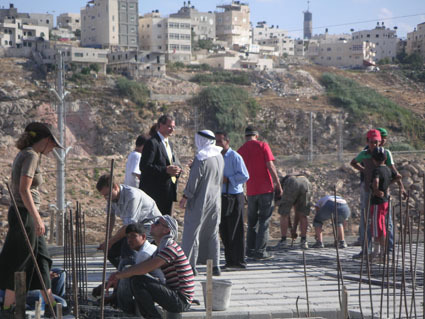Herbouw een gesloopt Palestijns huis deze zomer!
ICAHD - 09.01.2008 15:04
Sinds 2003 wordt er elk jaar een zomerkamp gehouden in Palestijns Oost-Jeruzalem waarin internationale activisten samen met Palestijnen een Palestijns huis herbouwen dat in het afgelopen jaar zonder gegronde redenen door de Israelische authoriteiten gesloopt is.

Het zomerkamp van vorig jaar
CREATING ALTERNATIVE FACTS ON THE GROUND
Where: Anata, East Jerusalem
When: 14th-29th July, 2008
In the summer of 2008, ICAHD will once again rebuild a Palestinian home, and invites you to participate in this incredible opportunity to learn first-hand about life under Occupation.
>>
Every year hundreds of Palestinians are forced from their homes, built on land they own. They watch helplessly as Israeli bulldozers and pneumatic drills destroy their homes in minutes. The Israeli government claims that these houses are illegal because they have been constructed without building permits; however, the Israeli authorities refuse to grant building permits to Palestinians.
The bulldozing and demolition of Palestinian homes by the Israeli government is illegal under international law. The Fourth Geneva Convention, adopted on 12 August 1949, states:
“Any destruction by the Occupying Power of real or personal property belonging individually or collectively to private persons, or to the State, or to other public authorities, or to social or cooperative organizations, is prohibited, except where such destruction is rendered absolutely necessary by military operations” (Article 53)
2008 SUMMER REBUILDING CAMP
Working with local Palestinian construction workers and community members, alongside Israelis, camp participants rebuild an entire house in two weeks. They also have the opportunity to get to know the family whose house is being rebuilt. At the end of the two weeks there is a dedication ceremony that includes speeches from local dignitaries and internationals and features a celebration with Palestinian music and dance. The ceremony culminates as the keys to the rebuilt house are handed over to the family. Festivities continue with a traditional feast that marks the end of the camp.
GUEST SPEAKERS: The summer camp invites presentations from activists, artists, scholars, intellectuals and leaders who are engaged in the struggle to resist the Occupation in non-violent, creative and constructive ways working to provide alternatives to the current situation.
Past guests have included Israeli historian Ilan Pappé, Arik Ascherman from Rabbis for Human Rights, Shir Hever from the Alternative Information Center, as well as representatives from Machsom Watch, New Profile, Bat Shalom, The Jerusalem Centre for Women, B'tselem, Al-Haq, and Combatants for Peace, among others.
FIELD TRIPS: Participants will explore and observe the impact of settlement expansion and house demolitions; visit Jerusalem, Bethlehem and Hebron and see how the construction of the Wall and the building of massive check points impedes and controls Palestinian movement; tour the Negev Desert region inside Israel and learn how the Bedouin are fighting forced removal from their lands; explore Ramallah; visit one of the many refugee camps created in 1948; and meet people whose lives have undergone dramatic transformations as a result of the Occupation.
The Israeli government’s policy of settlement expansion, construction of the Wall, house demolitions, road closures, checkpoints and restricted bypass roads work together to accomplish what Jeff Halper characterizes as the Matrix of Control. The field trips make it possible to personally witness the methods used by the Israeli authorities to limit available land and resources for use by any future Palestinian state.
Settlements: Many are built on privately owned Palestinian land and serve to put Israeli Jewish “facts on the ground” in the Palestinian territory. Planned by Ariel Sharon, they are meant to be impediments to returning land to the Palestinians in an eventual “Land for Peace” deal.
The Separation Wall/Fence: The path of the Wall snakes deep into the West Bank, serving as a barrier that encircles and “protects” the illegal settlements. In many cases, the barrier cuts through privately owned Palestinian land - including fields and orchards - which makes it less accessible to its owners, (hence impeding their ability to support their families), and furthermore divides Palestinian communities.
House Demolitions: With the Israeli authorities designating Palestinian areas as “military zones” or “agricultural areas,” all new construction or rebuilding becomes illegal and homes can be demolished if owners don’t have permits (which are almost impossible to obtain). In addition, the Israeli government refuses to give building permits to Palestinians who want to build on their own land if it sits in the designated path of settlements or the Wall. Israel then issues demolition orders for the houses that Palestinians, desperate for a place to live and angry about policies that deny them the right to build on their own land, build anyway. In this way while the Israeli government demolishes homes built “illegally”, for lack of permits that they refuse to grant, they build huge settlement blocs and the Wall in contravention of international law.
Road closures, Checkpoints and “Restricted” bypass roads: The free movement of Palestinians is impeded by closures and checkpoints turning a 20-minute trip into one that can take anywhere from several hours to several days to complete. Ambulances are unable to transport critically ill patients and women in labor to hospitals in time to treat them properly. At the same time that Palestinian mobility is restricted, new roads that Palestinians are not legally permitted to travel on are built to serve the settlements. They not only further divide the Occupied Territory but also require Palestinians to travel out of their way, often for miles, to cross over or under them.
Contacts:
• All inquiries about the camp – ICAHD-ISRAEL:  lucia@icahd.org lucia@icahd.org
 Website: http://www.icahd.org Website: http://www.icahd.org
|


